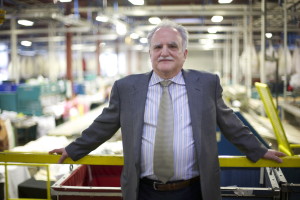White Plains Linen, the county”™s largest commercial laundry operator, has signed a 10-year contract with Wheelabrator Westchester L.P., a waste-to-energy plant, marking the start of a long-term renewable energy partnership.
This partnership helps the Peekskill-based laundry operator reduce its carbon footprint by 90 percent and allows Wheelabrator to take the lead as a clean energy provider for other businesses in the county.
The 100,000-square-foot laundry, which once operated on natural gas and oil, will now run on steam power for 88 hours a week. The steam supply at Wheelabrator is highly reliable, said Brett Baker, Wheelabrator plant manager.

“Our everyday operating statistics show that steam power is 99 percent reliable, and we”™ve been around for 27 years to prove it,” Baker said. “We take our boilers down for planned maintenances maybe three times a year.”
Wheelabrator receives anywhere from 150 to 200 truckloads of garbage a day, equivalent to more than 2,000 tons. The garbage is burned in utility boilers creating thermal energy, which is then piped to a turbine where the steam expands and generates electric energy, Baker said. Wheelabrator creates 60,000 kilowatts of power at a time, which is enough to power 88,000 homes, he said.
Through steam power, White Plains Linen will significantly reduce the amount of natural gas used to make steam and hot water from 1 million therms per year to less than 90,000 therms per year, said Leonard Labonia, vice president of operations at White Plains Linen. (A therm is a unit of heat equal to 100,000 Btu.)
An underground steam pipeline will connect Wheelabrator to White Plains Linen and continuously provide ready-made energy to power its laundry operations. This reduction in natural gas will eliminate 4,775 metric tons of greenhouse gas emissions annually, which is equivalent to taking 995 passenger vehicles off the road, Labonia said.
The energy cost will remain fixed at $90,000 a month, said White Plains Linen President Bruce Botchman. He hopes shifting toward cleaner energy will “put us on the map” as an eco-friendly business that knows how to make smart savings and lead the industry in innovative energy solutions.
White Plains Linen, the leading linen supply company in the tristate area, employs 550 people, with the prospect of growing its workforce by 10 percent over the next two years, Botchman said.
White Plains LinenӪs customers include well-known restaurateurs such as Jean-Georges Vongerichten, owner of several Manhattan restaurants, Danny Meyer, owner of Gramercy Tavern and Union Square Caf̩, and Mario Batali, owner of Tarry Lodge and Babbo Ristorante. In Westchester, White Plains Linen provides services to the Ritz-Carlton in White Plains and Tappan Hill Mansion in Tarrytown.
With a high volume of customers using business services in Peekskill, Mayor Mary Foster said this energy efficient project was a long time coming. In 2009, Foster said Peekskill joined the Northern Westchester Energy Action Consortium with the hope of addressing the high cost of energy and finding ways to fund demonstration projects.
Once White Plains Linen found out Wheelabrator had the ability to provide clean energy through an underground steam pipeline, it jumped on board.
“The cost of gas and oil is a wild card,” Labonia said. “It responds to headlines in the newspapers. Here we have a fixed cost with steam. We”™re dictating our growth instead of predicting it. We know what our energy costs each month.”
With a decreased reliance on fossil fuel and a heightened awareness of preserving natural resources, the city will continue looking for ways to find renewable resources that support the growth of businesses, Foster said.
“Peekskill has been a city of innovation,” Foster said. “The fact that a laundry company and a business that burns garbage can come together like this to create a new utility is truly innovative. This takes time to develop. It doesn”™t just fall out of the sky.”

















